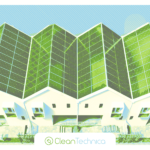What are Renewable Energy Systems?
Renewable energy systems are devices that convert energy from natural resources, such as sunlight, wind, and water, into usable forms of energy. This is in contrast to traditional fossil fuels, which are finite and have significant environmental impacts. Renewable energy systems are becoming increasingly important as we transition to a more sustainable future.
Types of Renewable Energy Systems
Solar Energy
Solar energy is generated from the sun’s rays, which can be harnessed using solar panels. There are several types of solar panels, including:
* Photovoltaic (PV) panels, which convert sunlight into electricity
* Solar water heaters, which use the sun’s heat to warm water
* Solar space heaters, which use the sun’s heat to warm buildings
Wind Energy
Wind energy is generated by harnessing the power of the wind using wind turbines. There are two main types of wind turbines:
* Horizontal axis wind turbines, which are the most common type
* Vertical axis wind turbines, which are more compact and suitable for urban areas
Other Renewable Energy Systems
Other types of renewable energy systems include:
* Geothermal energy, which uses heat from the Earth’s core to generate electricity
* Biomass energy, which burns organic matter (such as wood or agricultural waste) to produce heat and electricity
* Hydro energy, which harnesses the power of moving water to generate electricity
* Tidal energy, which harnesses the power of ocean tides to generate electricity
* Biofuels, which are fuels made from organic matter (such as plants or agricultural waste)
Benefits of Renewable Energy Systems
Environmental Benefits
Renewable energy systems have several environmental benefits, including:
* Reduced greenhouse gas emissions: By reducing our reliance on fossil fuels, we can lower our carbon footprint and slow the pace of climate change.
* Conservation of natural resources: Renewable energy systems can help us conserve natural resources, such as water and land, by reducing the need for extraction and processing.
* Improved air quality: Renewable energy systems produce zero emissions, which can help improve local air quality and reduce pollution.
Economic Benefits
Renewable energy systems also have several economic benefits, including:
* Job creation: The renewable energy industry is creating new job opportunities in manufacturing, installation, and maintenance.
* Reduced energy costs: Renewable energy systems can reduce energy costs by providing a cheaper and more reliable source of power.
* Increased property values: Solar panels, in particular, can increase property values by providing a clean and sustainable source of energy.
How to Choose the Right Renewable Energy System for You
Assess Your Energy Needs
Before choosing a renewable energy system, assess your energy needs and identify the best system for your situation. Consider the following factors:
* Your energy usage patterns
* The size of your property
* The amount of sunlight available
* The wind speeds and direction
Select the Right System Type
Based on your assessment, select the right type of renewable energy system for your needs. Consider the following factors:
* The cost of the system
* The amount of energy it can produce
* The space required for installation
* The noise level (for wind turbines)
Integrating Renewable Energy Systems
Grid-Connected Systems
Grid-connected renewable energy systems are connected to the power grid and can sell excess energy back to the utility company. This is a good option for homes and businesses with consistent energy needs.
Off-Grid Systems
Off-grid renewable energy systems are not connected to the power grid and require energy storage. This is a good option for homes and businesses in remote areas or those with variable energy needs.
Conclusion
Renewable energy systems offer a clean and sustainable alternative to traditional fossil fuels. With a wide range of options available, it’s easier than ever to integrate renewable energy into your daily life. Whether you’re a homeowner, business, or government entity, renewable energy systems can help you reduce your carbon footprint and save money on energy costs. By understanding the benefits, types, and implementation of renewable energy systems, you can make an informed decision and join the transition to a more sustainable future.
FAQs
What is the most cost-effective renewable energy system?
Solar energy systems are often the most cost-effective option, with prices dropping dramatically over the past decade.
What is the best location for a wind turbine?
Wind turbines require consistent and high wind speeds, typically above 6.9 mph (11 km/h). Avoid areas with trees, buildings, or other obstructions that can reduce wind flow.
How do I maintain my renewable energy system?
Regular maintenance is key to ensuring your system operates efficiently. Regularly inspect your system, clean solar panels, and replace parts as needed.
Can I sell excess energy back to the utility company?
Yes, grid-connected renewable energy systems can sell excess energy back to the utility company, known as “net metering” or “feed-in tariffs.” This can help offset your energy bills and generate additional income.


.png?w=150&resize=150,150&ssl=1)




.png?w=150&resize=150,150&ssl=1)